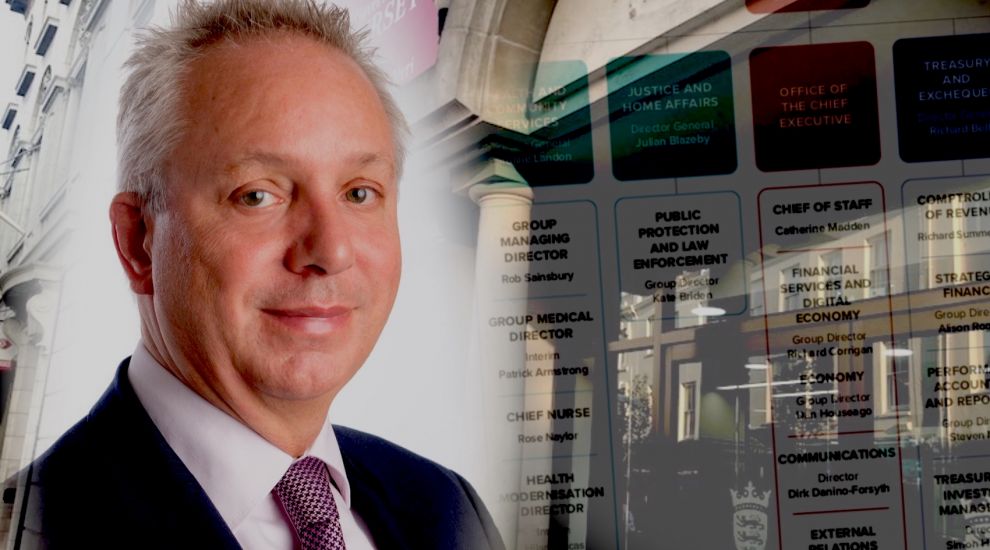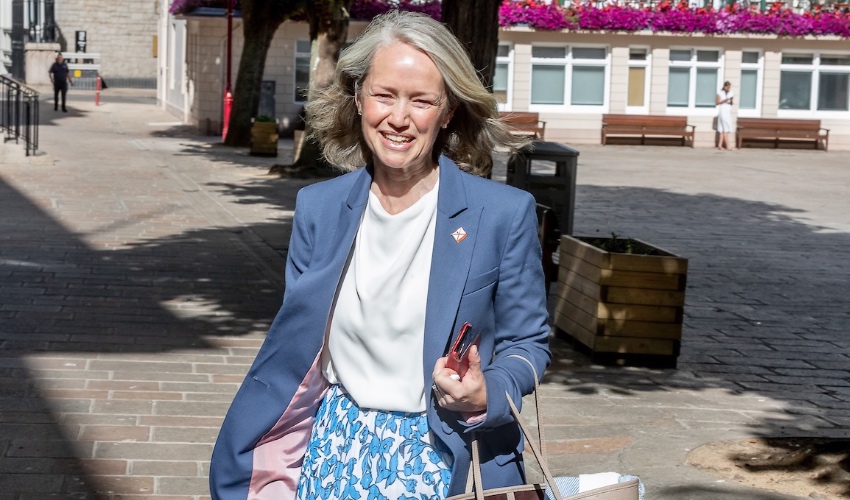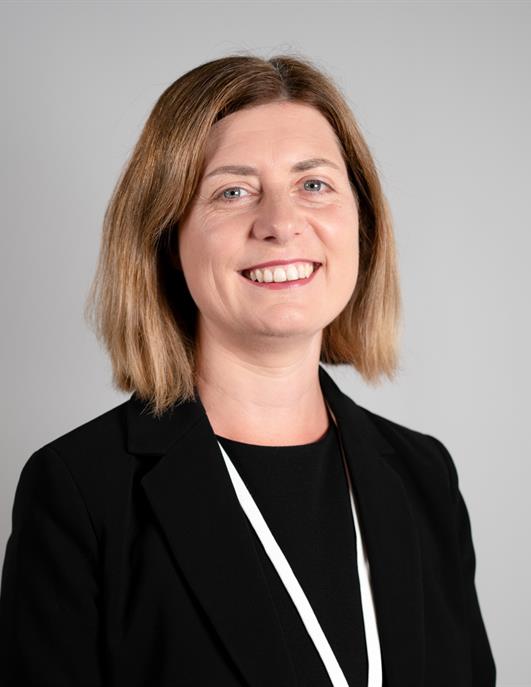


One of Jersey’s highest paid civil servants is leaving his role at the end of the month as part of a shake-up aiming to unpick key elements of ex-CEO Charlie Parker’s ‘OneGov’ reform.
The government confirmed last week that the Chief Operating Officer for the last four-and-a-half years, John Quinn, had decided to take voluntary redundancy as part of a “consultation process underway with senior leaders,” instigated during the formation of a Cabinet Office.
Express explores his appointment and departure, and the changing structure of Government…
It was in March 2018 that the recently appointed Chief Executive, Charlie Parker, unveiled ‘OneGov’ – a plan to tear up the structure of Government with the creation of seven new departments, each with their own ‘Director General’ rather than ‘Chief Officer’, as the most senior leaders had previously been known.
Two of the most radical changes were the creation of the Department of Strategic Policy, Performance and Population (SPPP) – a team responsible drafting long-term policies – and the Chief Operating Office to oversee 'back office' services including HR, procurement, and IT operations.
Pictured: Charlie Parker announcing the OneGov reforms.
Admitting that there would be managerial “casualties”, Mr Parker was clear that OneGov’s aim was to save money and make Government run more efficiently.
A series of appointments to the top roles created by the restructure came in the months that followed, with John Quinn recruited in July 2018.
Mr Quinn – who previously worked at Westminster City Council, where Charlie Parker had been Chief Executive – beat off competition from more than 30 applicants.
Figures published in the government’s 2021 accounts showed that Mr Quinn had a total remuneration package of between £205,000 and £220,000, with his salary between £175,000 and £180,000 plus pensioned-related benefits of up to £30,000 and other remuneration of between £5,000 and £10,000.
His overall pay bracket was only exceeded by Mr Parker – who left with a £500,000 pay-off in March 2021 – and the Director General for the Economy Department.
Two of the highest profile projects Mr Quinn was given responsibility for were Mr Parker’s ‘efficiencies’ regime – a drive to save £100m in four years – and ‘ITS’ or Integrated Technology Solutions.
The rapidly rising costs of ITS – an evolved version of the ill-fated eGov – saw him come under heavy scrutiny by the Public Accounts Committee.
Deputy Inna Gardiner, the then-Chair who has since become Education Minister, said her panel had “serious concerns” and that there appeared “to be a lack of strategy”.
Deputy Gardiner was not alone in her concerns about OneGov projects – perhaps the most vocal critic from the political arena was former Chief Scrutineer, and now Chief Minister, Kristina Moore.
Just weeks after taking the island’s top political role, Deputy Moore revealed on Express’ Politics Disassembled podcast that one of her first acts would be to start dismantling Mr Parker’s reforms by:
creating a Cabinet Office;
linking Ministers clearly to a department once again; and
reconsidering the powers of the Chief Executive.
The goal of creating a Cabinet Office, according to Deputy Moore, is to “allow Ministers to set the political direction, strengthen our decision-making and drive improvement and efficiency across government.”

Pictured: The new Chief Minister, Kristina Moore, hopes that a Cabinet Office would "restore lines of accountability in government departments".
The idea first emerged after Ministers past and present came together to assess how well Jersey is being run and concluded that a Cabinet Office may enhance coordination and accountability.
Creating a Cabinet Office will mean bringing together the Office of the Chief Executive (under which Communications sits), SPP and the Chief Operating Office.
Consultation over exactly how exactly the restructure will work have been ongoing since.
While the consultation won’t be finished until at least the end of Q1 2023, it has already seen a few changes – among them, the move of communications officers into the new department, and the quiet return of the ‘Chief Officer’ title.
So quiet was the title’s return that communications officers did not appear to be aware. When a release was sent out announcing Rob Sainsbury as the new leader of CYPES in mid-December, he was initially referred to as ‘Director General’. The Government contacted media later that day to ask that his new title was changed in any articles to ‘Chief Officer’.
When Express asked about the rationale for the title change, the Government responded with a statement signed off by Chief Executive Suzanne Wylie reading: “As part of the changes which will deliver an integrated Cabinet Office at the centre of Government, it was recommended that the job titles of the most senior posts should be meaningful for Islanders.
“The name change, from Director General back to Chief Officer, was agreed by the Council of Ministers and is a return to what is stated in Jersey legislation. The Chief Officers were consulted on this change, and all were happy to have their titles returned.”
A key question the consultation will have to resolve is who will lead the new Cabinet Office.
Any decision to seek a new recruit rather than appoint internally may raise some eyebrows, particularly within the business community, given the Chief Minister’s previous statements that the Government “cannot carry on recruiting more people” and that her Council’s focus is on “delivering value for money”.
No advertisements are currently running for the post.
Aside from John Quinn, the two other most senior figures whose departments will be involved in the merge are Chief of Staff Catherine Madden, who previously spent more than 20 years working for Liverpool City Council, where Charlie Parker was once responsible for regeneration projects, and Tom Walker, who was previously Chief Officer of Community and Constitutional Affairs when Kristina Moore was Home Affairs Minister.
The Government said it would not be providing any detail on the consultation process to the media.
“As this affects employees, a running account of events will not be given,” a statement read.
Scrutineers will be following the process closely.
Public Accounts Committee Chair Lyndsey Feltham, of Reform Jersey, also intends to ask more questions about Mr Quinn’s departure, including any potential redundancy payment.
She’ll have the opportunity to do so at a hearing with CEO Suzanne Wylie on 1 February.

Pictured: Deputy Lyndsey Feltham, Chair of the Public Accounts Committee, will be asking questions about the restructuring and Mr Quinn's departure.
“We are intending to ask about the new structure and how it will impact the effectiveness and efficiency of the organisation,” she said.
“We are mindful that senior leaders should be treated the same as other government employees and, of the recommendations made by the Comptroller and Auditor General following the departure of Charlie Parker.
“We hope the mistakes from the past aren’t repeated.”
Comments
Comments on this story express the views of the commentator only, not Bailiwick Publishing. We are unable to guarantee the accuracy of any of those comments.